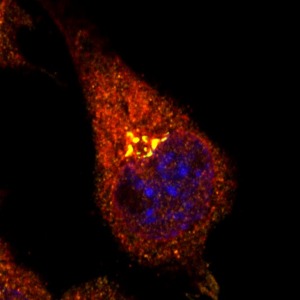Natural process can curb beta-amyloid production, scientists discover
by
Lisa Chamoff, Contributing Reporter | August 26, 2015

Bright, yellow clusters
are high cellular
concentrations of WAVE1
Researchers at The Rockefeller University in New York City have discovered how the brain naturally decreases the production of beta-amyloid, which could lead to a new approach to the treatment of Alzheimer’s disease.
In the study, published online earlier this month in Nature Medicine, the scientists at The Fisher Center for Alzheimer's Research found that a molecule called AICD, another cleavage product generated together with beta-amyloid, can regulate the gene expression of a protein called WAVE1, which is important in the production of beta-amyloid. This is a naturally occurring regulatory mechanism to prevent the overproduction of beta-amyloid, though the scientists say Alzheimer’s disease somehow overrides this protective effect.
The researchers looked at mouse and cellular models of Alzheimer’s disease, as well as the brains of human patients with the disease, and found the levels of WAVE1 were unusually low. When the scientists further reduced WAVE1 gene expression in the mice, their beta-amyloid levels decreased and they performed better on memory tests.
“We found a novel, protective pathway,” Dr. Yong Kim, a Fisher Center scientist at Rockefeller University, and one of the study’s authors, told HCB News. “By using this knowledge, we may create a new therapeutic agent for Alzheimer’s disease.”
Future research will focus on the development of a drug that would activate the pathway the scientists discovered, reducing WAVE1 function in beta-amyloid production, Kim said.
The work was funded by the Fisher Center for Alzheimer’s Research Foundation, which backs a team of more than 50 scientists at Rockefeller University led by Dr. Paul Greengard, who was awarded the Nobel Prize in Physiology or Medicine in 2000.
“We are proud of the excellent research, paving the way for new Alzheimer’s medications, done by the Fisher Center for Alzheimer’s Research Laboratory at the Rockefeller University,” said Kent Karosen, president and chief executive officer of the Fisher Center for Alzheimer’s Research Foundation. “The dedicated team of scientists work hard every day in the quest to cure Alzheimer’s and with this new finding, we’re one step closer.”
Dr. Dean Hartley, director of science initiatives at the Alzheimer’s Association, said that while he believes it will be a long time before the research serves a clinical benefit, it is important in understanding the mechanics involved in Alzheimer’s. He compared it to heart disease, and the importance of a patient having an annual cholesterol test as a preventive measure.
“Trying to understand that is really critical for understanding the disease and looking at specific targets,” Hartley told HCB News.
|
|
|
You Must Be Logged In To Post A Comment
|
